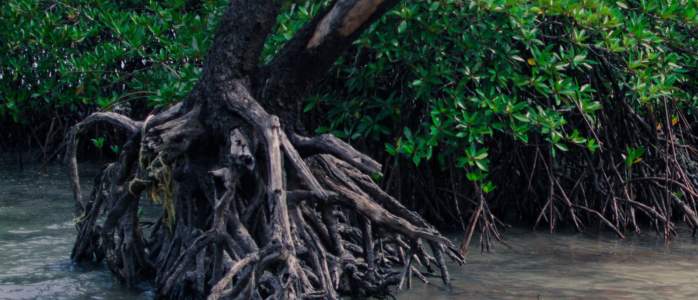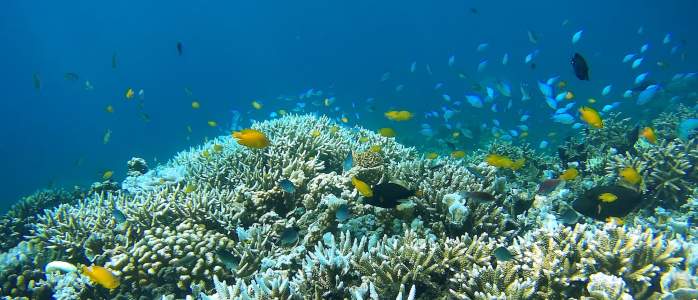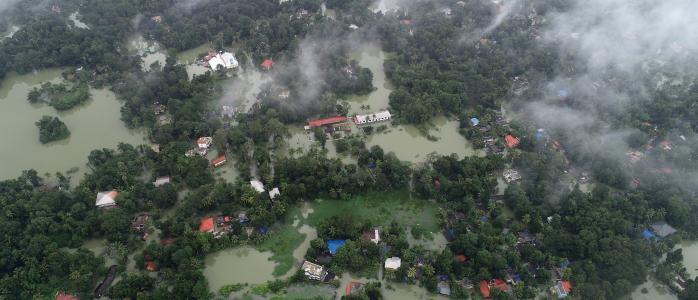



The world is facing an impending climate crisis on one end and socio-economic turmoil on the other. At a time like this, the symbiotic practices of living with nature can solve a multitude of the problems we currently face. In 2016, the International Union for Conservation of Nature (IUCN) defined such solutions as Nature-based solutions (NbS) – "Nature-based solutions are actions to protect, sustainably manage and restore natural and modified ecosystems in ways that address societal challenges effectively and adaptively, to provide both human well-being and biodiversity benefits".1 NbS include activities such as restoration, management, protection, creation of habitats, and food production across a plethora of ecosystems such as coral reefs, mangroves, peatlands, salt marsh, forests, and grasslands.
India has tremendous potential when it comes to nature-based solutions – it can provide sustainability, jobs, and growth. NbS are currently implemented under different schemes and programmes in India including Mahatma Gandhi National Rural Employment Scheme (MGNREGA) and missions under the National Action Plan on Climate Change (NAPCC). For example, almost 60 per cent of the activities allowed under the NREGA are related to natural resource management, which comes under the purview of NbS. Under its Nationally Determined Contributions (NDCs), India has mentioned a target of creating an additional sink of 2.5 to 3 billion tonnes of CO2 by increasing forest and tree cover by 2030 and identified 12 National Biodiversity Targets under its National Biodiversity Action Plan. A variety of ecosystem services under NbS ranging from cultivation of climate-resilient crops to restoration and management of wetlands could help India achieve these targets.
Nature-based solutions have the potential to meet one-third of climate mitigation targets needed to meet the goals set under the Paris Agreement, save USD 57 billion in flooding damages every year, and provide additional benefits worth USD 170 billion through a variety of ecosystem services. Further, it is suggested that doubling investments could significantly contribute to reducing emissions (from 5 GtCO2/year by 2025 to 15 GtCO2/year by 2050), halt biodiversity loss and restore close to 1 billion hectares of degraded land. Moreover, a report by the International Labour Organization (ILO) suggests that a threefold increase in NbS expenditure could generate approximately 20 million jobs globally, especially in South Asia.
However, even after the recognised capabilities of these solutions, the funding currently flowing into NbS is abysmal not only in India but globally as well. The State of Finance for Nature released by the United Nations Environment Programme (UNEP) identified that only USD 154 billion per year is being invested in NbS globally wherein the contribution of the private sector constitutes only 17 per cent of the total amount.
The Government of India has taken actions to scale NbS as highlighted in the recently released Union Budget of 2023. It launched two novel programmes, namely the ‘Mangrove Initiative for Shoreline Habitats and Tangible Income (MISHTI)’ and ‘Amrit Darohar’ to encourage the optimal use of wetlands and to build the livelihoods of the local communities and preserve such ecosystems. Further, India has made significant progress in recognising the importance of NbS in tackling the impacts of climate change, but there is also a need to address issues such as inadequate funding, weak institutional capacity, and lack of public awareness and participation in building resilience. The following are some steps, which can help create an enabling environment to channel investments towards NbS:
With India leading the G20 presidency in 2023 and NbS being a key area of focus in the next meeting of the Conference of Parties (COP28), India could become a global leader by boosting investments and providing support to other developing countries in scaling and mainstreaming NbS.
Shreya Wadhawan is a Programme Associate and Aryan Bajpai is a Consultant at the Council on Energy, Environment and Water. Send your comments to [email protected].
1The United Nations Environment Assembly (UNEA) passed a resolution (UNEP/EA.5/Res.5), adopting a modified version of the IUCN definition. This resolution identifies NbS as ‘actions to protect, conserve, restore, sustainably use and manage natural or modified terrestrial, freshwater, coastal and marine ecosystems, which address social, economic and environmental challenges effectively and adaptively, while simultaneously providing human well-being, ecosystem services and resilience and biodiversity benefits’.






Add new comment